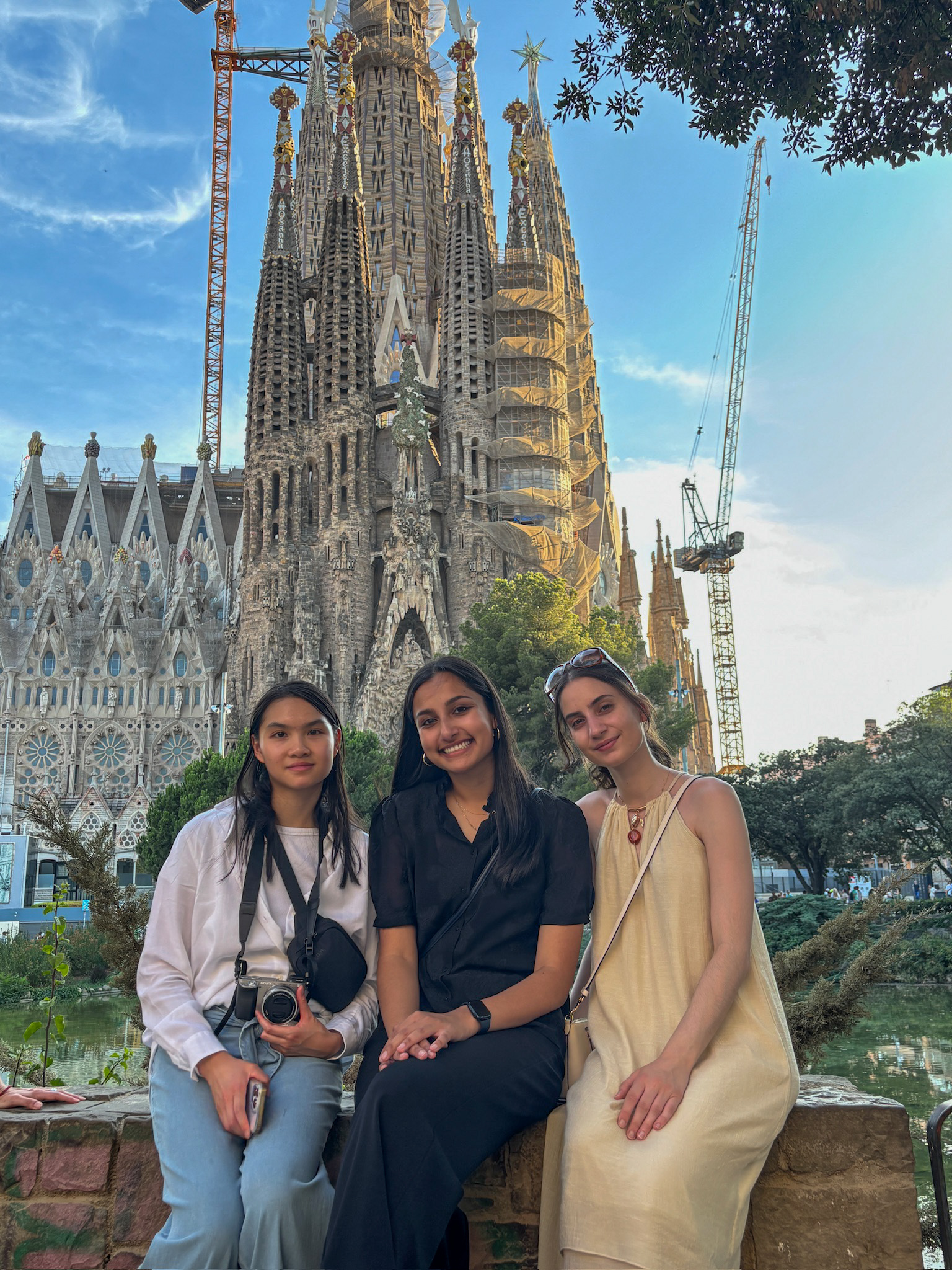Summer Check-In: Three Students Present Research at Conference in Barcelona, Spain
Sabeen Safi ’26, a pre-dental public health major, shares her experience of presenting the work she’s done on vaping and the oral microbiome in the lab of Muhlenberg Associate Professor of Biology Giancarlo Cuadra.Monday, July 14, 2025 10:33 AM
.JPG) Danna Berro ’26, Sabeen Safi ’26, and Cathy Tran ’27 with their posters at the International Association for Dental, Oral, and Craniofacial Research (IADR) General Session
Danna Berro ’26, Sabeen Safi ’26, and Cathy Tran ’27 with their posters at the International Association for Dental, Oral, and Craniofacial Research (IADR) General SessionClasses may not be in session, but Muhlenberg students are still hard at work — at internships and jobs, in the lab and in the field, producing creative works and engaging with their communities. Summer break is an opportunity for students to explore future pathways, unanswered questions, and avenues for impact. Discover what our students are up to this summer here.
Sabeen Safi ’26
Hometown: Chambersburg, Pennsylvania
Major: Public health (pre-dental)
Describe the research you presented at this conference.
Our project examines the impact of electronic cigarette liquids, particularly flavorings such as cinnamon and menthol, on the bacteria in our mouths. Healthy mouths rely on “commensal” bacteria, such as Streptococci, to keep harmful microbes, like Porphyromonas gingivalis (a key contributor to gum disease), in check. We found that e-cigarette liquids can impair the growth of both commensal and pathogenic bacteria, potentially disturbing the microbial balance. Understanding these altered microbial interactions is key to understanding how vaping may impact oral health.
“[Associate Professor of Biology Giancarlo] Cuadra always encourages us to present our research because he believes it’s one of the best ways to learn and collect helpful feedback. Presenting the project helped me gain valuable input to improve our work.”
Why were you interested in presenting at the International Association for Dental, Oral, and Craniofacial Research (IADR) General Session?
I was drawn to the IADR General Session because of the diverse range of perspectives represented, including those of microbiologists, public health researchers, and dentists. As a public health major conducting biology research, it was a great opportunity to learn from experts across different fields.
Since I’m applying to dental school this cycle, I also saw it as an opportunity to network with dental professionals, academics, and students, hear about their experiences, and learn more about the latest developments in oral health research. [Associate Professor of Biology Giancarlo] Cuadra always encourages us to present our research because he believes it’s one of the best ways to learn and collect helpful feedback. Presenting the project helped me gain valuable input to improve our work. It also gave my public speaking skills a good run. Plus, the chance to explore Barcelona and be part of an international scientific community made the experience even more meaningful.
“We had to prepare really well, but after all was said and done, we were able to push through and present and answer confidently. Many people were surprised to learn we were undergrad students.”
What was most challenging and most rewarding about presenting at this conference?
The most challenging aspect of presenting at IADR was undoubtedly being an undergraduate surrounded by so many experienced researchers and clinicians. Initially, I was nervous about being caught off guard or being unable to answer questions. Some of the discussions were just beyond our level of understanding, but that was still okay; we still learned a lot. We had to prepare really well, but after all was said and done, we were able to push through and present and answer confidently. Many people were surprised to learn we were undergrad students.
The best part was talking with current dental students and professionals. Everyone was friendly, and it was great being around people with similar interests and values. I had the opportunity to connect with people from the schools I’m applying to as well as others from around the world and learn about how dental training varies across different countries. I was also surprised by how extensively AI is already being used, from diagnostics to treatment planning, which really highlighted how fast the field is evolving.
How has this experience shaped your understanding of what you want to do in the future?
Conducting research on how vaping affects the oral microbiome made me realize how closely clinical dentistry and public health are connected. Vaping’s popularity, driven partly by misinformation, highlights the need for dentists who understand more than just what’s happening in someone’s mouth. You also need to understand the patient demographic and social constructs around the local community.
Presenting at IADR reinforced that being a dentist goes beyond clinical work; it’s about seeing the bigger picture and making an impact through policy and advocacy. Hearing researchers and students worldwide discuss oral health within systemic and social contexts has inspired me to consider pursuing a master’s in public health in conjunction with dental school. I want to be a dentist who not only treats acute symptoms but also works to prevent problems at the systemic level, using my voice to push for better health outcomes for everyone.
At Muhlenberg, Safi is president of the Student Government Association, a research assistant in the Cuadra Lab, a tour guide, and an Interfaith America BRAID (Bridgebuilders Relating Across Interfaith Differences) Fellow.

